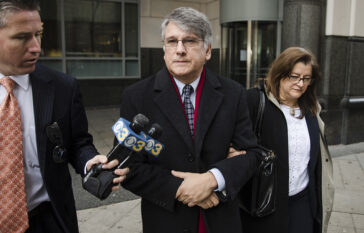Best of the States
Multiple AP exclusives in all formats from mass shooting at California bar
Just before midnight on the day after California staffers were up late covering the midterm election came reports of a shooting at a country music bar in Thousand Oaks, about 40 miles northwest of Los Angeles. Over the next 12 hours, as the scale of the carnage emerged, Sacramento correspondent Kathleen Ronayne, Washington-based reporters Mike Balsamo and Tami Abdollah, and photographer Mark Terrill and video journalist Krysta Fauria, both based in Los Angeles, combined to provide exclusive all-formats content for AP customers.
Despite the hour, Fauria and Terrill were on the scene within 90 minutes of the first reports coming in. Terrill made tight shots of the scene that no one else could match – his photos were used heavily by numerous outlets. Meanwhile, Fauria quickly set up a live shot, the first of four she would do over 12 hours at three locations. She also got AP’s first interview from a survivor.
Reporter Ronayne, bleary-eyed from the long election night, provided the first live video of authorities searching the shooter's home, while Balsamo used a source to break the widely played news that the murder weapon was a handgun, not an assault weapon.
As other news organizations pulled photos of the gunman from social media, Balsamo’s Washington colleague – and fellow AP-Los Angeles alumnus – Tami Abdollah used a source to obtain a driver’s license photo that is believed to be the first and still perhaps the only rights-cleared image of the gunman.
For providing news, photos and video that others couldn’t, Ronayne, Terrill, Balsamo, Abdollah and Fauria win this week’s Best of the States award.













